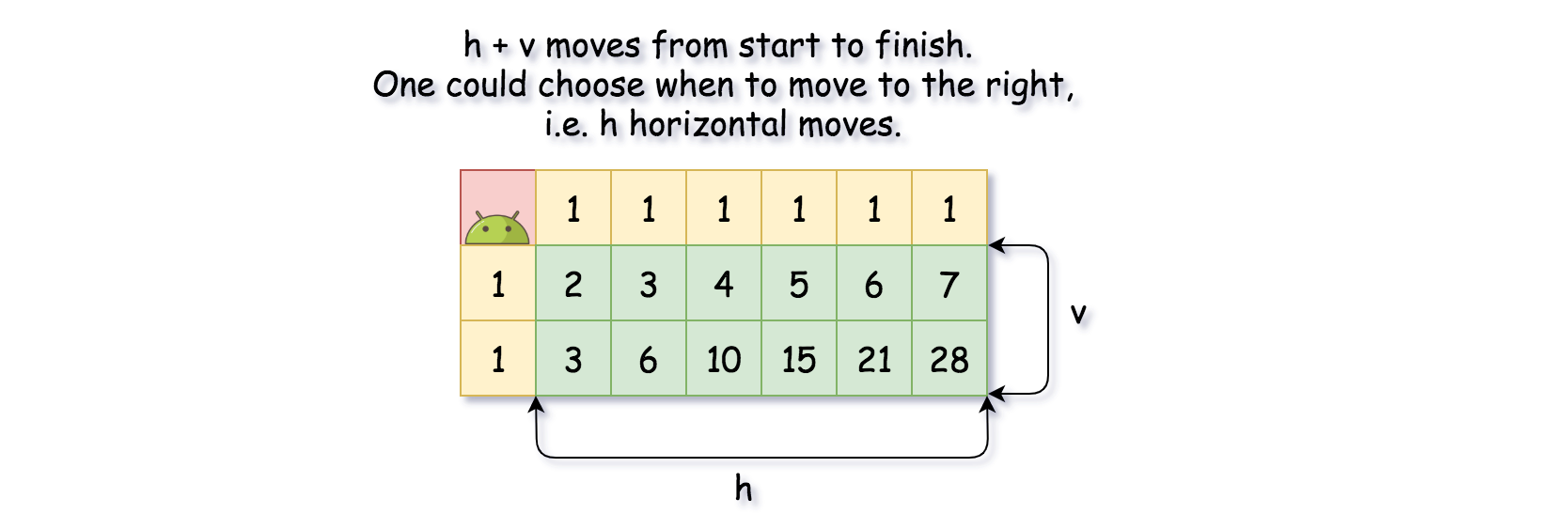Combinatorics
-
https://leetcode.com/problems/count-collisions-of-monkeys-on-a-polygon/description/
-
There are n monkeys at pos i in an array.
-
Each monkey must move once
-
If they move in opposite directions, a collision happens.
-
Return the number of collisions
-
Is it easier to count the number of collisions or no collisions?
-
No collisions = 2 for any n, because monkeys can all move cw or ccw
-
Situations with collisions =
-
https://leetcode.com/problems/unique-paths/solutions/504514/unique-paths/
-
In other words, we’re asked to compute in how many ways one could choose p elements from p+k elements. In mathematics, that’s called binomial coefficients
-
The problem is a classical combinatorial problem: there are h+v moves to do from start to finish, h=m−1 horizontal moves, and v=n−1 vertical ones. One could choose when to move to the right, i.e. to define h horizontal moves, and that will fix vertical ones. Or, one could choose when to move down, i.e. to define v vertical moves, and that will fix horizontal ones.

DP
- Useful for aggregating multiple combinations/permutations
- Find recurrence relation with a previous state
Count number of answers ‘with some conditions’ that end in ‘X’
DFS with States
https://leetcode.com/problems/student-attendance-record-ii/description/
Count in Valid Intervals
https://leetcode.com/problems/plates-between-candles/description/
Count Number of Texts
https://leetcode.com/problems/count-number-of-texts/description/
def countTexts(self, pressedKeys: str) -> int:
n = len(pressedKeys)
dp = [0]*(n+1)
dp[0] = 1
m = 10**9+7
prev = pressedKeys[0]
for i in range(1, n+1):
dp[i] = dp[i-1]%m
if i >= 2 and pressedKeys[i-1] == pressedKeys[i-2]:
dp[i] = (dp[i] + dp[i-2])%m
if i >= 3 and pressedKeys[i-1] == pressedKeys[i-3]:
dp[i] = (dp[i] + dp[i-3])%m
if i >= 4 and pressedKeys[i-1] == pressedKeys[i-4] and pressedKeys[i-1] in '79':
dp[i] = (dp[i] + dp[i-4])%m
return dp[n]Permutations and Combinations
Number of Ways to Reach a Position After Exactly k Steps
Go from start to end on an infinite number line in exactly k steps https://leetcode.com/problems/number-of-ways-to-reach-a-position-after-exactly-k-steps/description/
- We have k items -> k! orderings
- We have two types of items (left or right) which are indistinguishable -> divide by left! and right!
- This is equal to k choose left (which is equivalent to k choose right)
def numberOfWays(self, startPos: int, endPos: int, k: int) -> int:
diff = endPos - startPos
mod = 10**9+7
if (k - abs(diff))%2 != 0 or abs(startPos-endPos) > k:
return 0
return comb(k, (k-abs(diff))//2) % modCounting
Count Subarrays with Exactly K ‘x’
- exactly k = (at least k) - (at least k-1)
Number of Ways to Get from Top-Left to Bottom-Right
Only down and right moves are allowed
Sum Vowels of All Substrings
https://leetcode.com/problems/vowels-of-all-substrings/
- For a vowel at position i, how many substrings can be made with it?
- Group 1: There are i letters before it
- Group 2: n-i letters after it
- Append the ith vowel to one of the groups
def countVowels(self, word: str) -> int:
total = 0
vowels = set('aeiou')
for i,c in enumerate(word):
if c in vowels:
total += (i+1)*(len(word)-i)
return totalSum Distinct Score of All Substrings
From that problem, we use the fact that each character appears in (i + 1) * (n - i) substrings. However, it does not contribute to the appeal of substrings on the left that already include that character.
- Store indices of previous occurrences of the current character
def appealSum(self, s: str) -> int:
prev = defaultdict(lambda: -1)
res = 0
n = len(s)
for i,ch in enumerate(s):
res += (i-prev[ch]) * (n-i)
prev[ch] = i
return res
Plates Between Candles
Count plates between 2 candles for all queries
- We don’t actually have to count plates
- Number of plates between 2 candles = number of spots on the range (candle i, candle j) - number of candles in this range
def platesBetweenCandles(self, s: str, queries: List[List[int]]) -> List[int]:
candles = [i for i,c in enumerate(s) if c == '|']
res = []
for a,b in queries:
i = bisect_left(candles, a)
j = bisect_right(candles, b)-1
res.append(candles[j]-candles[i] - (j-i) if i < j else 0)
return res